Twisted-Wonderland
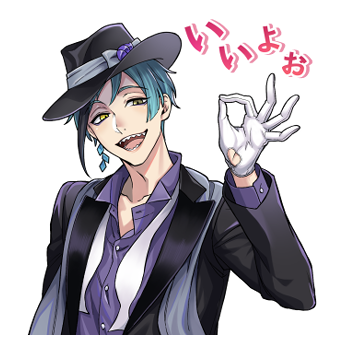









Twisted-Wonderland
More Posts from Mewtski and Others
Azul Ashengrotto - Platinum Jacket (Voice Lines)
Following is my translation of the voice lines for Azul's Platinum Jacket card.
Spoilers after the cut.
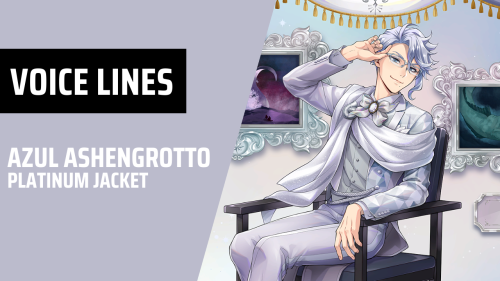
Summon
🐙: What a phenomenal art collection - priceless works as far as the eye can see… This is the perfect opportunity to refine one's eye for beauty, wouldn't you say?
🐙: Appreciating the arts is the best way to strengthen one's imagination. Let us study well, and have a wonderful time today.

Home Lines
🐙: A hundred year anniversary, eh. That's simply amazing.
🐙: Floyd is as freewheeling as ever in museums. Though an eel he may be, he's nothing at all like the pair that served the Sea Witch.
🐙: I came across Vil admiring a piece of artwork very intently. When I inquired with him, he said he was simply studying the beautiful pose. I wouldn't expect anything less from a professional such as him.
🐙: It feels great to learn a piece you've had your eye on has increased in value. It's confirmation that your intuition was correct.
🐙: If there's a piece you're interested in, please don't hesitate to ask me about it. I've been studying the fine arts as part of my education, and am sure I could offer you at least a simple explanation.
🐙: Jamil-san appears to have a sharp eye for fine art, and I'll be glad to continue our acquaintanceship.
🐙: The King of the Underworld was said to be skilled in the art of negotiation. I'd love to read more about it - more so in detailed accounts, rather than just anecdotes.
🐙: Amongst those in the managerial profession, many have hobbies related to the fine arts. Being well-versed in art, music, and literature comes in great use when talking business.
🐙: I presume Ortho-san can identify counterfeits quite easily using his sensors… Perhaps if the opportunity arises, I'll inquire with him about it.
🐙: I wonder just how many merfolk the Sea Witch assisted throughout her life. She was such a mighty mage it could've been hundreds… perhaps even thousands.
🐙: This corsage was designed based on the shell the Sea Witch would wear on her necklace. It's lovely, isn't it?
🐙: Oh, my. That glimmer in your eyes… If you've taken a liking to that piece, I'd be happy to procure a reproduction for you - and I'll throw in a special discount for you, of course.
Groovy
🐙: Love is a wonderful thing. One's troubles never end when one has fallen in love, and it's a marvelous boon for those of us in the consultation business.

DUO
🐙: I could certainly use some assistance here, Jamil-san.
🐍: Well you certainly don't look it, Azul.
You can read my summary of this card's vignette over here on my twitter.
![✍︎ Damnation [ The Diviner ]](https://64.media.tumblr.com/fef2e2273806f21993606380e60aac10/7b92d64a5fa45353-27/s500x750/57625ec655f85f88d8586b1c6b93e19662b0c511.jpg)
✍︎ damnation [ the diviner ]
– Summary: When you commit a crime, you receive a punishment. This is especially true in your society. No matter the crime, your punishment is the same: banishment. But to where you will be sent in exile and how miserable will it be? No one knows, because no one has ever returned.
– Warning: Yes, this is a yandere thing. Gender-neutral reader.
– Characters: Floyd Leech, Jade Leech, Azul Ashengrotto.
– Note: I’m actually not super proud of this result. Out of the three out so far, this one is probably like my least favorite. Maybe that’s why I’ve been putting this off for a while and also rewriting Scarabia’s result a lot, just because I don’t want to feel like I did a bad job on it once I do complete it. Currently, at the time this is being posted, Scarabia’s result is like halfway done. Here’s to hoping its a good result.
– Pages: 40
– Not satisfied? Try looking here for the quiz to take it yourself and see where you end up banished!
The Hyena Chieftain | The Diviner | The Vizier’s Vassal
Keep reading


my beautiful princess with a disorder

this panel from the world guide of falin being surrounded by other girls while laios is all alone kills me because. that's it. that's the key difference in their journeys.
as laios states himself, he left the village in order to create a home for him and falin elsewhere. a home that won't collapse due to others' hatred and fears like their old home did, a home where they are loved and accepted unconditionally. but as he soon found out, even before earning money, or having walls surrounding him and a roof above his head- what he so earnestly desired was to meet other people who will accept him for who he is as well. instead, he kept being tormented by those around him, shunned and sneered at. his loneliness quickly became all-consuming until he truly had nothing left except for the monsters in the pages of his book, but even that became a target of mockery and destroyed. that's why ever since the day he left the village, he never felt that he truly made the right choice. so he kept running away: unable to resist and unable to accpet.



and an ocean away from him there was his sister, who never managed to fully fit in herself. but unlike him, she met a person who became a home to her and learned what a true friendship was for the first time in her life. and laios clearly realizes that too when he finally sees falin and marcille together, he can tell his sister obtained the greatest treasure there is on her own- the exact thing he never managed to find anywhere himself, thus coming back empty-handed to the sister he left the village for.

but when you read this part of the manga, laios's focus is on falin's loneliness, not his own. he talks about how it hurts thinking about all those moments she had to spend alone because he wasn't there for her, so it almost sounds like he's the one who couldn't bear her suffering and therefore decided to not let her go again. but we do get a glimpse of their first meeting after that almost-decade long separation in the manga, and then we see more of that in the world guide and daydream hour- and it becomes abundantly clear that it was falin who was trying to protect and save him from this pit of loneliness and depression he was in.



so instead of just doing his best to atone for leaving her behind in the village and making sure she is never lonely again, it might also be that laios was desperately clinging to the one person in the world he felt that accepted and loved him unconditionally. those words he used to describe his motivation to stay by falin's side are the exact words she would've used as well; she couldn't bear leaving him behind in this state. in a sense, they were each other's shackles.
but then she did. she died for him and their friends, and ironically enough, it was by leaving him alone like this that he was finally able to stand on his own and put his full trust in others. to have the courage to reveal who he is and give others the opportunity to accept him after such a long time of hiding. it was a long journey, but his hiding finally came to an end when he faced the others after shedding his monster form. and i love that the person who was falin's "home" all those years away from laios, marcille, became just as meaningful to him during their time separated from falin- the first one to find him and show him that he isn't alone anymore. just as he did for her.


so at the end of the story when falin talks about all the places she would like to go, it's not just that she wants to pursue her own dreams- but that she actually feels free to do so and go anywhere she desires. and one of the main reasons for that is that her brother finally found new people he wants to be with; his own home.
At some point in your life, you were taught that being slightly annoying is an unforgivable sin. Maybe it was by your parents or a teacher or a friend or a bully or an older sibling. But someone taught you that being slightly annoying is a crime punishable by death.
You must unlearn this.
You must accept that all people will be annoying at some point or another in their lives, maybe all of their lives, and that this is okay. It is okay for strangers on the bus, it is okay for children in the grocery store, it is okay for people on social media, and it is okay for you.
If you ever want to truly love your fellow humans, if you ever want to truly love yourself, you must have forgiveness for being annoying.

Thinking about Chilchuck recommending his daughter replace him. Thinking about Marcille's fear of outliving everyone. Thinking about Marcille staying friends with Chilchuck's family for generations and generations.
(This was originally an ask received through Twitter)
"Back in GloMas (on JP), I think I remember there being a lot of madness surrounding Idia being close to Yuu. I think it’s because he referred to them as ‘Yuu’ rather than ‘Yuu-shi’, but I still don’t quite get it??"
Yes! Honorifics as a whole have already discussed more in-depth here, but Idia does drop his honorific for the prefect once in Glorious Masquerade.
Quick overview for those who may not know: when you don’t use an honorific with someone (-chan / -kun / -sama / etc), this is called yobisute (呼び捨て), written with the kanji for “to call” and “to throw away,” and the word might just not exist in English. It means “to refer to someone without an honorific."


Twst uses honorifics (and yobisute) to track the evolving relationships between the characters.
Deuce, for example, has a line about how he used to yobisute his teachers (i.e. he refused to add “-sensei” to their names) in middle school. To compensate for his past rudeness, Deuce now refers to every single upperclassman by “lastname-senpai.”



There is even a cute scene during New Year’s where Deuce greets Jamil by calling him Viper-senpai, but after Jamil feeds him an egg salad sandwich he changes—just once—to Jamil-senpai.


Epel is another character whose use of honorifics is significant: Epel is under order from Vil to always use honorifics with everyone. During Book 5 we see him using “-kun” with Deuce, up until Deuce refuses to let Epel fight the bullies trying to steal their blastcycle.
Deuce says that he is the one who took Epel out of the school and so he will be taking responsibility for his actions, and we get Epel’s first “Deuce” yobisute.


Cater might be the character who weaponizes honorifics the most.
He seems to be using honorifics as an over-familiarity-buffer-zone, as he is actively trying to avoid becoming too close to those around him (re: “Cay-Cay doesn’t really do long-term friends or found family").


There is one exception to Cater’s rule of honorifics: Trey.
During Book 1 Cater refers to him as “Trey-kun” for the majority of the story, until Riddle’s overblot makes things serious enough for him to drop it and call him “Trey” (even during these scenes, however, he keeps his honorifics for others).
The novel even comments on this directly, saying, "Usually, Cater does not ever yobisute anyone. When he calls to Trey, he always adds ‘kun’ to his name. This is probably one of his skills as a good-natured person. When Cater uses Trey’s name like this, it is only when he is really serious. Only when it is important."
This is all to say that, depending upon the character, yobisute can be a huge deal. It isn’t a black-and-white rule, of course—it varies by each character and their personality.
Kalim, for example, refers to everyone with yobisute, possibly because his status back home meant that he was simply never taught to defer to anyone, and/or because he legitimately considers himself to be close, personal friends with everyone he meets.



Idia is one of those characters like Cater and Deuce for whom yobisute is a big deal. There is exactly one person he refers to without any form of honorific, and that person is Ortho. Much like how he uses his tablet to avoid talking to people face-to-face, he is possibly, intentionally keeping up an over-familiarity-wall like Cater.
The English-language adaptation has translated his honorific of “-shi” as “Mr.,” but it’s actually gender-neutral, which may be why the English-language game’s continuity is so inconsistent, and why the moment of Idia referring to the prefect without an honorific did not make it to EN: while the honorific disappears and reappears in English, he actually uses it to refer to the prefect in Book 6, and it is otherwise in 100% of all of Idia’s dialogue in the original game.
With one exception: Glorious Masquerade.


This is why JP lost its collective mind when it happened (the fan-art is delightful, like this short comic of the characters pointing at Idia and chanting "yobisute"), because it is something Idia had never done before and has never done again, and it was with the prefect.

Yobisute is usually very significant in the game, like during Book 6 where Azul, who uses the “-san” honorific with literally everyone except Jade and Floyd, uses yobisute with Riddle when he is in danger, and when Riddle uses it with Leona just before his overblot in Book 2.
Which means it will be interesting to see if Idia is going to continue with this yobisute-ing of the prefect outside of Glorious Masquerade! (which would be great for confirmation that it wasn't just a proof-reading error ww)

TWST Christmas Icons 2024 Edition
Free to use!!
Azul 🐙



Jade and Floyd 🍄🌊





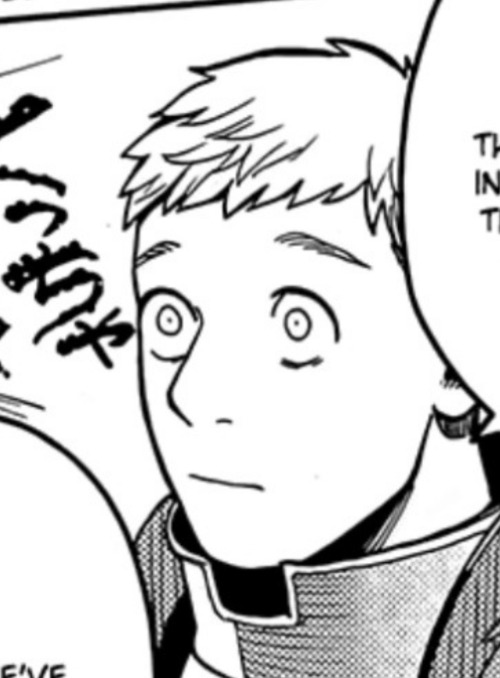





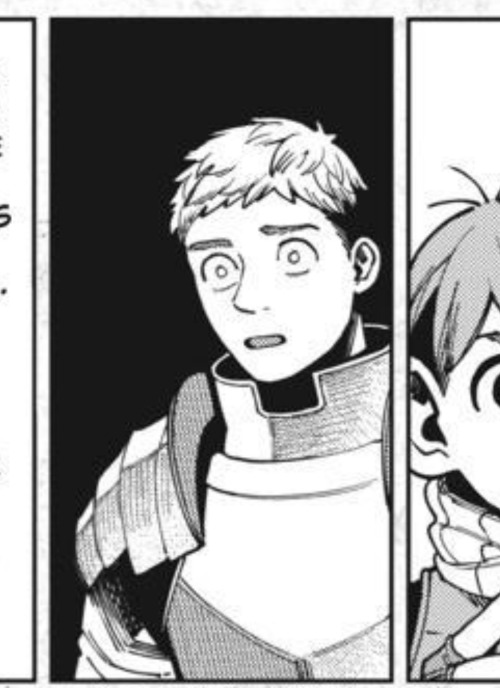
small non-exhaustive collection of laios making That Face




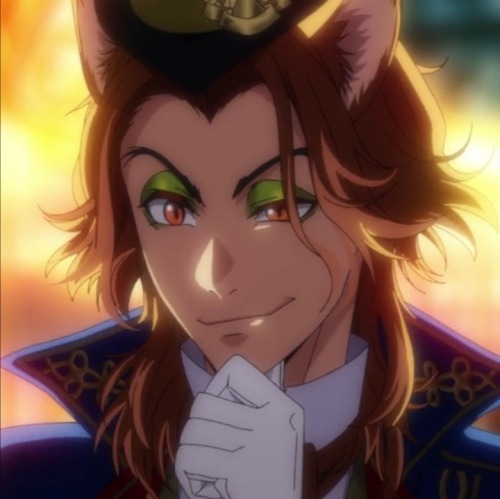

FELLOW HONEST SHAKES
-
 oktissango liked this · 1 week ago
oktissango liked this · 1 week ago -
 flopping258bangus liked this · 2 weeks ago
flopping258bangus liked this · 2 weeks ago -
 bokchoychopsuey liked this · 4 weeks ago
bokchoychopsuey liked this · 4 weeks ago -
 hollyhoshi liked this · 1 month ago
hollyhoshi liked this · 1 month ago -
 yuubrokemylegs liked this · 1 month ago
yuubrokemylegs liked this · 1 month ago -
 kalimfan liked this · 1 month ago
kalimfan liked this · 1 month ago -
 twichoid liked this · 1 month ago
twichoid liked this · 1 month ago -
 boywings liked this · 2 months ago
boywings liked this · 2 months ago -
 gutz02 liked this · 2 months ago
gutz02 liked this · 2 months ago -
 phaningaround liked this · 2 months ago
phaningaround liked this · 2 months ago -
 redrxsethorns liked this · 3 months ago
redrxsethorns liked this · 3 months ago -
 oni-dressin reblogged this · 3 months ago
oni-dressin reblogged this · 3 months ago -
 jodieeeeee232 liked this · 3 months ago
jodieeeeee232 liked this · 3 months ago -
 wuah liked this · 3 months ago
wuah liked this · 3 months ago -
 oubaka liked this · 3 months ago
oubaka liked this · 3 months ago -
 nixs liked this · 4 months ago
nixs liked this · 4 months ago -
 owochiken liked this · 5 months ago
owochiken liked this · 5 months ago -
 lia-lagami-tmnt liked this · 6 months ago
lia-lagami-tmnt liked this · 6 months ago -
 citrusbian reblogged this · 6 months ago
citrusbian reblogged this · 6 months ago -
 bl4ssing liked this · 6 months ago
bl4ssing liked this · 6 months ago -
 eggwitch24 liked this · 6 months ago
eggwitch24 liked this · 6 months ago -
 68thsposts liked this · 6 months ago
68thsposts liked this · 6 months ago -
 abditorysaudade liked this · 6 months ago
abditorysaudade liked this · 6 months ago -
 thecatandtheparty reblogged this · 6 months ago
thecatandtheparty reblogged this · 6 months ago -
 thelamentknight reblogged this · 6 months ago
thelamentknight reblogged this · 6 months ago -
 thelamentknight liked this · 6 months ago
thelamentknight liked this · 6 months ago -
 mrsunlucky1214 liked this · 6 months ago
mrsunlucky1214 liked this · 6 months ago -
 invidebitlavender liked this · 6 months ago
invidebitlavender liked this · 6 months ago -
 the-unhinged-raccoon liked this · 6 months ago
the-unhinged-raccoon liked this · 6 months ago -
 sunatoria liked this · 6 months ago
sunatoria liked this · 6 months ago -
 vivianwantstosleep liked this · 6 months ago
vivianwantstosleep liked this · 6 months ago -
 izita822 liked this · 6 months ago
izita822 liked this · 6 months ago -
 fluffy-penguin-paddelina liked this · 6 months ago
fluffy-penguin-paddelina liked this · 6 months ago -
 internalanguish liked this · 6 months ago
internalanguish liked this · 6 months ago -
 jossegv liked this · 6 months ago
jossegv liked this · 6 months ago -
 lididia0v0 liked this · 6 months ago
lididia0v0 liked this · 6 months ago -
 lykachu707 liked this · 6 months ago
lykachu707 liked this · 6 months ago -
 stonesinthelake liked this · 6 months ago
stonesinthelake liked this · 6 months ago -
 mysusoup liked this · 6 months ago
mysusoup liked this · 6 months ago -
 loesspressonight liked this · 6 months ago
loesspressonight liked this · 6 months ago -
 gabzabcherry liked this · 6 months ago
gabzabcherry liked this · 6 months ago -
 proudturtlesandwitch liked this · 6 months ago
proudturtlesandwitch liked this · 6 months ago -
 book-of-arts04 liked this · 6 months ago
book-of-arts04 liked this · 6 months ago -
 weeafw liked this · 6 months ago
weeafw liked this · 6 months ago -
 mewtski reblogged this · 6 months ago
mewtski reblogged this · 6 months ago -
 mewtski liked this · 6 months ago
mewtski liked this · 6 months ago -
 samyosaf liked this · 6 months ago
samyosaf liked this · 6 months ago -
 oathofoaks liked this · 6 months ago
oathofoaks liked this · 6 months ago